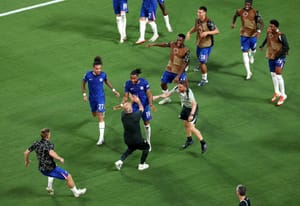In a match that will go down as one of Chelsea’s most remarkable victories, the Blues overcame a two-hour weather delay, a controversial penalty, and a grueling extra-time period to secure a 4-1 win over Benfica in the Club World Cup Round of 16 at Charlotte’s Bank of America Stadium. This enthralling encounter, spanning four hours and 39 minutes, showcased Chelsea’s resilience, tactical acumen, and attacking flair as they advanced to a quarter-final showdown with Palmeiras.
REECE JAMES!!! 🔥
— DAZN Football (@DAZNFootball) June 28, 2025
Chelsea have their first goal of the afternoon ⚽
Watch the @FIFACWC | June 14 - July 13 | Every Game | Free | https://t.co/i0K4eUtwwb | #FIFACWC #TakeItToTheWorld #SLBCHE pic.twitter.com/n2vd5JMN0S
A Game Disrupted but Not Derailed
Enzo Maresca’s Chelsea entered the match brimming with confidence after a 3-0 group-stage rout of Esperance Tunis. Facing a Benfica side that had upset Bayern Munich, the Blues controlled the first half with 74% possession, creating a flurry of chances. Marc Cucurella nearly broke the deadlock with a curling effort cleared off the line by Antonio Silva, while Cole Palmer was denied by Benfica’s goalkeeper Anatoliy Trubin at the near post.
The breakthrough came in the 64th minute via a moment of brilliance from captain Reece James. His cleverly disguised near-post free-kick wrong-footed Trubin, igniting the Chelsea contingent in Charlotte. The Blues seemed poised to close out the game, stifling Benfica’s counter-attacks with disciplined defending. However, with four minutes remaining, a lightning storm forced a near two-hour delay, halting play in the 86th minute. Players retreated to the dressing rooms, resorting to exercise bikes and impromptu keepy-uppy to stay loose.
When play resumed, Benfica capitalized on the disruption. A dubious free-kick led to a VAR-reviewed handball call against Malo Gusto, whose arm inadvertently met a Nicolas Otamendi header. Angel Di Maria, in his final Benfica appearance, slotted home the stoppage-time penalty to make it 1-1, forcing extra time.
Extra-Time Dominance Seals the Deal
Chelsea’s response was emphatic. Just two minutes into extra time, Benfica’s Gianluca Prestianni received a second yellow card for a foul on Levi Colwill, reducing the Portuguese side to 10 men. The Blues pounced on their advantage. In the 108th minute, Moises Caicedo, later named Superior Player of the Match, won the ball in Benfica’s half and linked with Cole Palmer. Caicedo’s low drive was parried by Trubin, but Christopher Nkunku reacted quickest, lifting the ball over Otamendi to restore Chelsea’s lead. Maresca’s animated sprint down the touchline mirrored the relief and euphoria in the Chelsea ranks.
With Benfica wilting, Chelsea’s substitutes took over. Pedro Neto, continuing his scintillating Club World Cup form, raced clear in the 114th minute to slot home his third goal in three matches. Three minutes later, Kiernan Dewsbury-Hall capped the rout, dinking the ball over Trubin after a rapid counter sparked by Robert Sanchez’s long clearance. The 4-1 scoreline reflected Chelsea’s relentless pressure and clinical finishing.
Key Performers and Tactical Mastery
Moises Caicedo was the linchpin, winning possession 10 times and completing 116 passes—a midfield masterclass not seen from a Chelsea player since Jorginho in 2021. His yellow card, however, rules him out of the Palmeiras clash. Reece James combined defensive solidity with his goal-scoring instinct, while Pedro Neto’s pace and Cole Palmer’s playmaking highlighted Chelsea’s attacking depth. Nkunku’s goal could be a defining moment for the forward, who has faced speculation about his future.
Maresca’s 4-2-3-1 setup, with Palmer drifting infield from the right, allowed Chelsea to dominate with 22 shots—their highest total in a Club World Cup match. The team’s ability to regroup after the weather delay and exploit their extra-time advantage underscored their mental toughness. Maresca, while critical of the “ridiculous” weather protocols, lauded his squad: “We controlled the game until 85 minutes… at 1-1, we stayed composed and deserved the win.”
Strategic Implications and the Road Ahead
This victory was more than a result—it was a statement of Chelsea’s evolution under Maresca. The seamless integration of substitutes like Nkunku, Neto, and Dewsbury-Hall demonstrated the squad’s depth, crucial for a tournament as demanding as the Club World Cup. The Blues’ ability to adapt to adversity, from the weather delay to the contentious penalty, signals a team maturing into genuine contenders.
With $54 million in prize money secured and a quarter-final against Palmeiras set for July 4 in Philadelphia, Chelsea have a chance to build on their 2012 Club World Cup legacy. The six-day break offers a vital window for recovery after this marathon match. If Chelsea maintain this blend of tactical discipline and attacking flair, they could go far. Palmeiras await, but on this evidence, the Blues are ready for the challenge.




